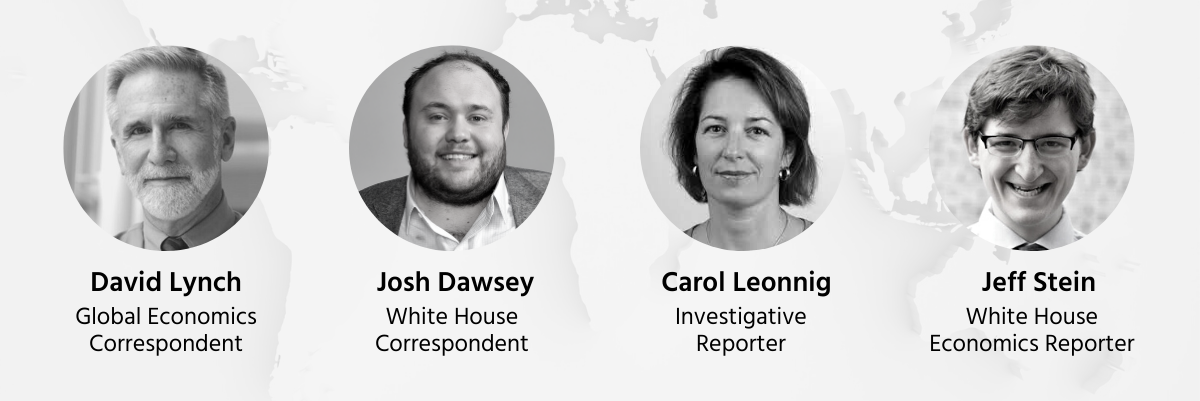Washington Post team wins Hinrich trade reporting award
Published 16 December 2020
David J. Lynch, Carol Leonnig, Josh Dawsey and Jeff Stein of The Washington Post have won the 2020 Hinrich Foundation Award for Distinguished Reporting on Trade for stories that brought to light the complexities of doing business in China in 2020.

David J. Lynch, Carol Leonnig, Josh Dawsey and Jeff Stein of The Washington Post have won the 2020 Hinrich Foundation Award for Distinguished Reporting on Trade for stories that brought to light the complexities of doing business in China in 2020.
Their stories shed light on how the coronavirus upended global supply chains as the pandemic spread from China to the rest of the world. They gave readers an indelible portrait of President Donald Trump’s trade adviser, Peter Navarro, illuminating how personality and politics affected the evolution of US policy. Post global economics correspondent Lynch showed how one multinational company, Flex Ltd., managed to profit from the upheaval by remaking supply chains built for efficiency into sourcing that emphasized resiliency, navigating away from China. Lynch’s story explained a shift that may foretell how pandemic adaptations could have lasting ramifications for global trade.
The National Press Foundation judges in particular praised the Flex piece, “Business Unusual,” as “fine, well-sourced and vivid storytelling.”
Lynch’s Flex story provided a “thorough, inside-out account of how a company that handles manufacturing of a whole universe of products — from Apple Mac Pros to Allergan eye drops — has navigated the sea changes and disruptions of the pandemic, at a time when the Trump administration was trying to argue against the very reality of supply chains,” the judges said. They called the details about how Flex coordinated production of more than one million parts at factories in 30 countries “fascinating” and said the piece skillfully blended the microeconomic and macroeconomic aspects of a sweeping global upheaval.
The profile of the fiery Navarro, director of the White House’s Office of Trade and Manufacturing Policy, disclosed that an investigation into Navarro’s behavior found him “chronically abusive” toward colleagues, but ended with him receiving only informal counseling.
“The trade specialist’s ascent from economics professor and failed California political candidate to one of the most central figures in the White House is a testament to his tenacity, indifference to bureaucratic formalities and ability to stay in the president’s ear,” they concluded.
A third award-winning scoop by Lynch and Dawsey revealed that the White House had delayed a decision on a major trade issue to pressure the government of Ukraine. They reported that Robert E. Lighthizer, the president’s chief trade negotiator, withdrew a formal recommendation to restore Ukraine’s trade privileges in August after National Security Advisor John Bolton warned him the president would reject any action that benefited the Ukrainian government.
Our founder Merle Hinrich presents this year's Hinrich Award to The Washington Post team and talks about his motivation behind the creation of this award.
The Hinrich Foundation Award was created in 2019 to recognize exemplary journalism that illuminates and advances the public’s understanding of international business and trade. It comes with a $10,000 prize. Last year’s winners were Paul Wiseman, Joe McDonald and Anne D’Innocenzio of The Associated Press. The 2020 National Press Foundation judges were Rick Dunham of Tsinghua University, Elaine Kurtenbach of the Associated Press, and Soumaya Keynes of The Economist.
Lynch, Leonnig, Dawsey and Stein received the Hinrich Foundation Award at NPF’s annual award ceremony, held online on Thursday, 18 February, 2021. Learn more about the awards celebration here.
© The Hinrich Foundation. See our website Terms and conditions for our copyright and reprint policy. All statements of fact and the views, conclusions and recommendations expressed in this publication are the sole responsibility of the author(s).
